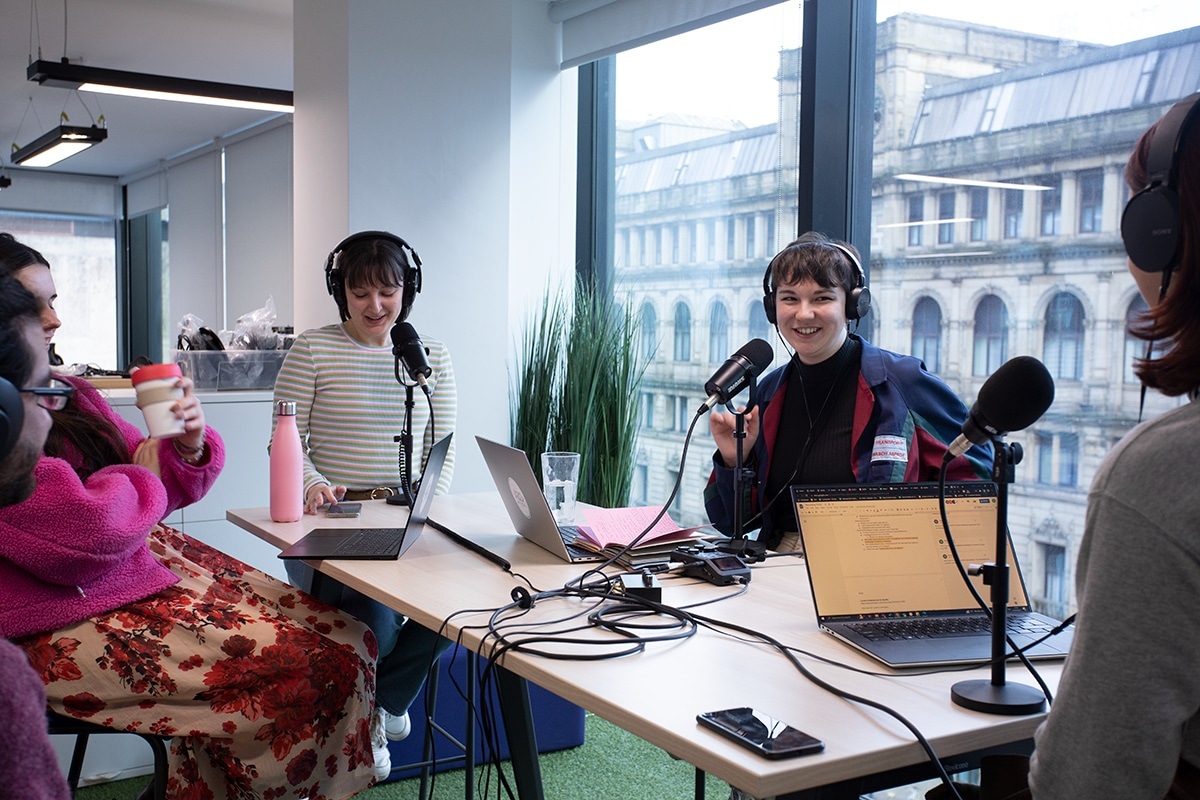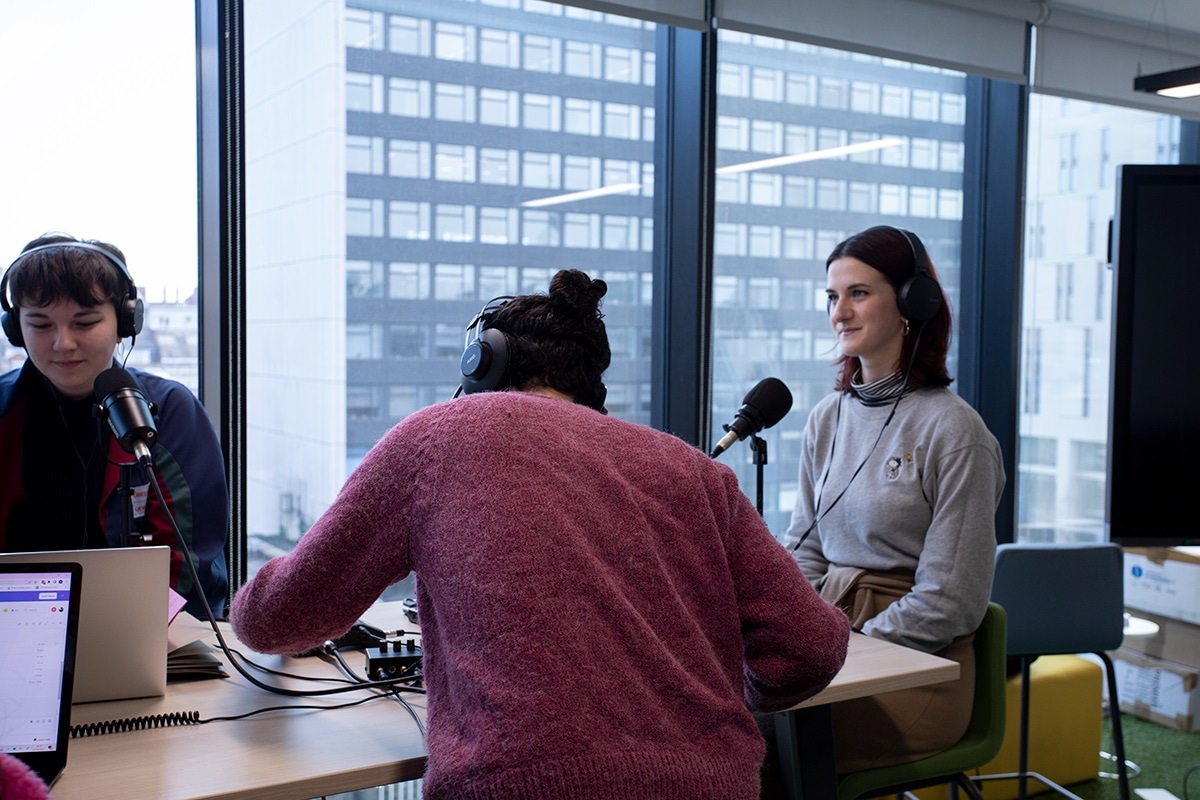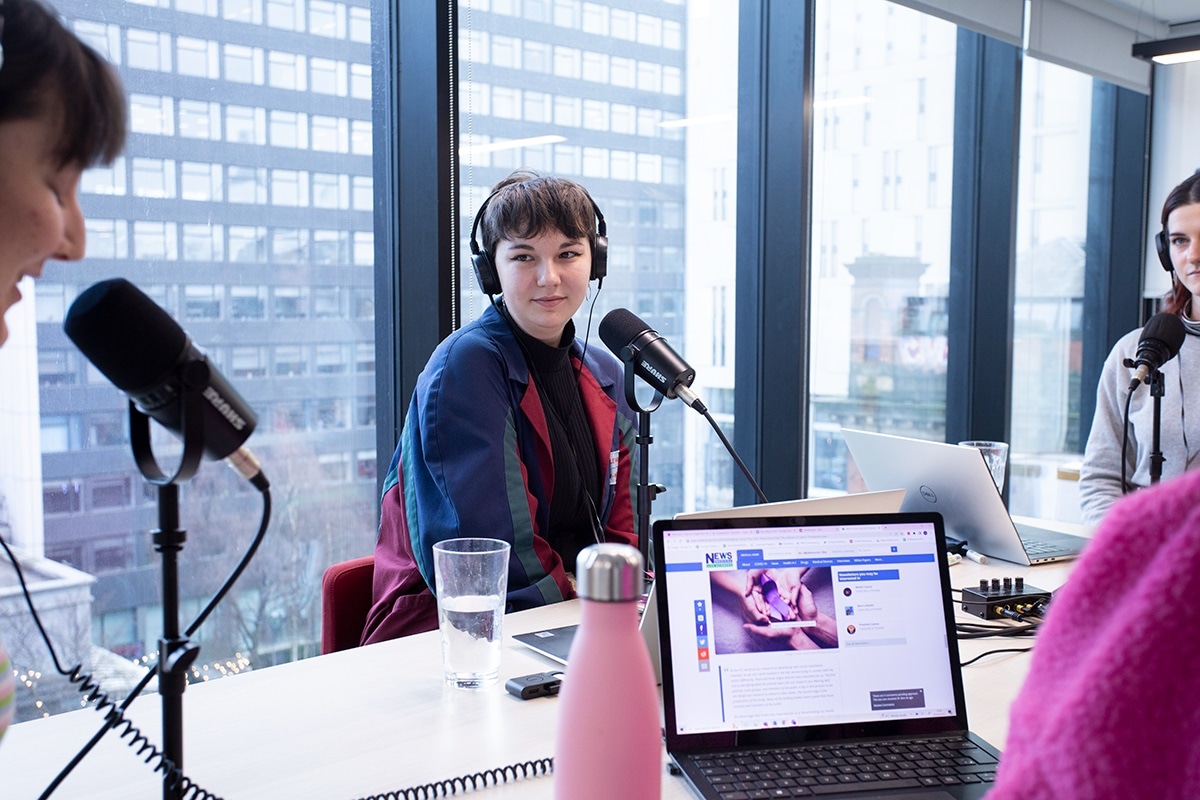.jpg)
In January 2023, a new journey in science communication began with the launch of the Something About Science podcast. This innovative podcast, created by the editors of AZoNetwork's sector-specific scientific sites, brings a fresh, engaging approach to discussing the latest research across various scientific domains. Whether it's polymers, tissue engineering, or nanotechnology that piques your interest, this podcast promises a unique blend of expert insights and captivating discussions for all science enthusiasts.
We interviewed the team behind Something About Science as the podcast approaches its first anniversary.

Can you share the story behind the inception of the 'Something About Science' podcast, what inspired you to start this project in January?
Meg: At AZo, we encounter so many exciting, new developments from across the scientific, medical and engineering fields daily. We share this with our audience through our websites and social media channels, but we wanted to take that further and show our audience what we, as Editors, find personally interesting. We felt that we had a unique position of being able to tap into such a broad range of topics through our (at the time) 11 different websites; we could give light to areas of science that normally wouldn’t get much attention.
We knew that this ‘show and tell’ style of communication needed a casual format that would be easily digestible, easily replicated, and allow us the flexibility to discuss topics around what we wanted to share. A podcast felt like a no-brainer.
Skyla: The podcast format is something that we had been wanting to do for a long time before we began the project, so it was incredibly exciting to finally come together and make it happen! We really wanted to leverage the knowledge base we already work with on a daily basis as well as the wonderful audio team that we have at AZoNetwork to bring a more personal dimension to our editorial output. Creating a fun, engaging, accessible, and educational platform was the goal of the whole team going into this.
How did you decide on the podcast's focus and structure, considering the wide range of topics covered by AZoNetwork's sector-specific sites?
Meg: We spent quite a bit of time on this, looking at different podcasts we listened to already and trying out new ones too; we each selected what we liked and didn’t like about these podcasts and discussed them as a group. For instance, we knew that we wanted the structure to be more casual than a news-style broadcast, so we looked to podcasts where a round-table discussion was more common and tried to replicate it. With three hosts in the mix, it made sense to each have something different to talk about and then take turns.
In terms of focus, I think we’re still figuring this out, but we do try and have an overarching theme or find topic connections for each of our chosen topics.
As you’ve said, AZoNetwork covers a wide range of sectors and industries, each distinct from one another. I think what makes Something About Science so unique is that we can access this knowledge base and not be confined to one sector. Where else will you have a podcast that can go from talking about fast-degrading plastics to the gut microbiome during menopause?
Skyla: As Megan has said, we see the wide range of topics covered by the sites as an opportunity. We try to move across all of the sites rather than being confined to what we are familiar with to keep the episodes fresh and engaging. It also gives us a chance as editors to explore stories and topics that are outside of the sectors we work on every day. I have personally been enjoying looking at clean technology and robotics content for the episodes, which I don’t have the opportunity to engage with as often. Whilst the episodes themselves have their own structure that works well and we try to stick to, I think our focus remaining broad is actually one of our biggest USPs.
Could you describe the collaborative process between the site editors in shaping the podcast's content?
Skyla: From the outset we always wanted the podcast to be a collaborative project that we all could contribute to creatively and editorially. When we started shaping the format of the podcast, we made sure that each of us had an equal opportunity to speak on the show, even down to our introductions and outros.
Whilst we individually write the scripts and source the stories for each episode, we try to link our ideas to an overarching theme in order to make it cohesive. We also collaborate with Aimee to make sure our content is accurate and well-communicated.
I think over the episodes you can tell where each of our interests lie and where our focus sometimes gravitates to in terms of the stories we choose, so it’s fun to hear each other be excited about what we bring to the table. When we discuss the stories after each segment there is genuine curiosity behind our questions, and we all try to engage with the presenter’s story in a way that allows them to deep-dive on their information and really explore the topic.
How do audio-visual experts contribute to enhancing the podcast experience?
Joao: Audio-visual editing and sound design play a very important role in enhancing the listener’s experience in this podcast. From the early stages of pre-production, we set out ambitious goals and shaped the format of the show by referencing several leading podcasts in the field of science communication (BBC Earth, Ologies, Life Scientific, etc). As a result, every Something About Science episode features background music during the segments where the hosts share their favorite science stories. The soundtrack for each episode is selectively curated by our producers and we often feature independent artists in diverse musical genres.
In addition, sound effects, ambient recordings, and customized jingles are often played to create an immersive and engaging environment for our audience. We wanted this show to have an informal and approachable tone, yet go beyond the classic “conversation” podcast format. We’re very proud of all the quirky little interplays between content, music and audio effects, and hope new listeners find the cacophony of sounds we use entertaining!

Can you share some behind-the-scenes insights into the recording and editing process?
Skyla: We have a lot of fun recording the episodes, and we sometimes joke about releasing a bloopers episode with all of our tangents. I don’t envy Joao having to go through and cut out all of our diversions, movie references, and terrible puns.
It is a really nice atmosphere when we record, and the team is very supportive of one another. No matter how many takes we have to do to record a section well or whether we have to do some on the fly fact checking during the episode, everyone is very patient and positive. There is also the fun part at the end of the episode where we try to come up with an intro sentence linking all the stories together.
Meg: Personally, one thing that continues to amaze me is the power of editing. There have been times when I have come out of a recording and wanted to do it again, dreading having to listen to myself during our review process. But each and every time, I can honestly say that this feeling disappears and the episode becomes a new favorite.
Aimee: During the recording process, I work alongside the show hosts to provide real-time fact-checking during the discussion portion of the podcast. We’re really committed to making sure that everything we communicate on the podcast is reliable and impartial. After recording, we complete a second round of fact checking, so we’re all confident with the accuracy of the stories that we share with our audience. Over the past year, my mid-recording Google searches have varied from insect gourmet to man-made shooting stars, so there’s never been a dull moment even behind the scenes.
What challenges have you faced in translating complex scientific concepts into engaging and accessible podcast content?
Skyla: This is an interesting topic and one that we have actually discussed on the show several times. Making scientific content accessible is something that all of us are very passionate about, and there have been many instances both on and off the mic where we have talked about how we are communicating our stories and how our format is reflecting our aims. It is sometimes a challenge because the content can be highly technical, but this is where I believe the conversational portion of the episode really has its strengths. By discussing the stories after each segment, we are able to situate them in context and break them down between the three of us.
It is also interesting because I don’t actually have a background in science in the same way that Danielle and Megan do, so we use my level of understanding of topics outside my knowledge base as a barometer for how well we communicate them.
Danielle: We definitely have to get creative sometimes. I recall early on Megan using the quantity of Walrus’ as a way to quantify something, to show the audience the sheer scale of what she was discussing. As silly as it may sound, this really encapsulates how “outside the box” you have to think when communicating complex scientific concepts.
Joao plays a key role in editing social media clips using interview recordings. How has this strategy impacted your audience reach and engagement?
Joao: Using social media clips to promote the episodes and attract new listeners has been very important. In this early stage of the podcast, it is still difficult to quantify the amount of new listeners that have started following the show due to social media. We’ve also been testing different types of social media clips, from collages of stock footage over audio snippets to live footage of the hosts during the recording.
So far, the feedback we’ve had from sharing these clips on the AZoNetwork LinkedIn and YouTube pages has been very positive. In the long run, however, we want to expand our social media presence and potentially make separate profiles for the show, so we can promote the show through dedicated Instagram Reels and other channels.
How do you choose the scientists and researchers featured on your podcast? What qualities or criteria do you look for in a potential guest?
Meg: The approach we take is likely similar to how we work as commissioning Editors on our sites; we think about what we find interesting and what we think our audience finds interesting. Thought Leaders may be individuals pioneering a new advancement, spearheading a new initiative, or working for an organization wanting to bring a new innovation to the industry. We also include interviews about topics that we are personally passionate about, or think are important to share - see Danielle’s interview with Professor Bruce Hood, Professor of Developmental Psychology and Society at the University of Bristol, about his course The Science of Happiness and Beyond.
We also think about current events or world awareness days. For example, ahead of International Women’s Day, I spoke with Meganne Christian, a member of the 2022 ESA Astronaut Group and Reserve Astronaut and Exploration Commercialisation Lead at the UK Space Agency.
Danielle: As we gain more experience communicating in the audio format, we have started to become more attuned to what would work best when listened to. For example, Skyla featured the news story of the sound of blackholes, which of course, worked really well on a podcast.
Skyla: I think to an extent our choice of guests is intuitive - we look for people that we think are capable of engaging our audience. When I interviewed Sascha Quanz of ETH Zurich about his exoplanetary research, I hadn’t originally intended to feature him on the podcast. The interview was only supposed to exist in a written format, but after hearing him speak in such a passionate and captivating way about his work, I knew I had to ask if we could include him in an episode.
Can you share a memorable moment or insight from an interview that particularly stood out to you?
Joao: Megan’s extreme sheep-led art off-tangent segment has been a highlight for me in terms of humorous and memorable content. Skyla’s interview with Sasha Quantz was also extremely fascinating and also one that stood out for me. There’s definitely been something memorable and curious in every episode though.
Danielle: Skyla’s story of space tourism always stands out to me - perhaps because I had never heard of it as a concept before. That’s the great thing about sitting around a (ping pong) table and discussing things when recording a podcast - you never know what the other hosts will bring to the table.

Reflecting on the first year since the podcast's launch, what have been some of the biggest challenges and learning experiences for the team?
Skyla: I would say that the biggest learning experience was getting used to being recorded. It took a little while for us to warm up to the format of sitting around a table with all of the equipment and having to talk as if it’s not there. We are much more relaxed and confident now, and I believe that is reflected in the quality of the episodes.
Meg: Getting into a routine with preparation for the podcast is one thing that comes to mind. Sourcing content in advance, or keeping a database of options has significantly improved the script-writing process as well as our time management.
Looking forward, what are your goals for the 'Something About Science' podcast in 2024?
Meg: Growing our audience base even further is a key goal. We recently hit 1000 downloads, our first major milestone, and hope to continue this success moving forward.
Improving our presence on social media channels is another goal we have discussed, as well as promoting our episodes on YouTube and exploring other ways to boost our engagement with our audience.